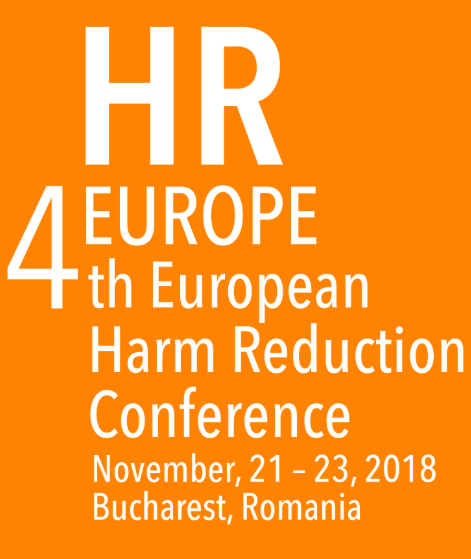
Time to Act! The 4th European Harm Reduction Conference

November 21, 2018
11.45 – 12.30
Panel discussion: Harm Reduction future: sustainability and impact
Moderator: Ganna Dovbakh and Wolfgang Phillipp
Naomi Burke-Shyne, HRI
Katya Lukicheva, OSI
Palani Narayanan, Global Fund
Susanna Ronconi, Forum Droghe, Italy
Marian Ursan, Carusel, Romania
12.30 – 12.45
“Chase the Virus, not People!”
Ganna Dovbakh, EHRA
16.00 – 17.30
Parallel session 7*: Bringing treatment to the community (HA REACT)
Chair: Alexandra Gurinova
Co-organised by the European Joint Action on HIV and Co-infection Prevention and Harm Reduction (HA-REACT), HA-REACT addresses existing gaps in the prevention of HIV and other co-infections, especially tuberculosis and viral hepatitis, among people who inject drugs (PWID). It is a joint effort of 23 organisations in 18 EU Member States, and focuses on those countries where there are obvious gaps in effective and evidence-informed harm reduction interventions, or where such interventions are not being implemented at a sufficient level.
Gender approach in testing and other harm reduction interventions
• Alexandra Gurinova, Deutsche Aids Hilfe, Germany
• Olga Belyayeva, Eurasian Harem Reduction Association, Lithuania
Integrated care for people who use drugs – challenges and recommendations
• Kristel Kivimets, National Institute for Health Development, Estonia
Responding to HIV and overdose epidemics in Estonia
• Aljona Kurbatova, National Institute for Health Development, Estonia
Drug policy change through the lens of OST treatment implementation in Lithuania
• Morgana Daniele, Youth Rise, UK
November 22, 2018
11.00 – 12.30
Parallel session 12*: Transition and sustainable funding of harm reduction (OSF), part 1
Room: 2 – MIRCEA ELIADE
Chair: Ekaterina Lukicheva
This session aims to increase the understanding of progress and key success factors that lead to sustainability of HR programs in countries transitioning from Global Fund’s support of HIV response to national funding including the role civil society and community representatives plays in these processes.
Participants will:
- Learn about the harm reduction financing changes and donor transition related processes taking place in SEE countries
- Better understand key facilitators and factors that lead to their programmatic and financial sustainability
- Learn from the experience of civil society and community representatives advocating for sustainability of HIV prevention services among key affected populations in their countries.
14.00 – 15.30
Parallel session 17*: How to leverage EU membership and accession for increasing sustainability and quality of harm reduction services at country level (OSI part 2).
Room 2 – MIRCEA ELIADE
Chair: Raminta Stuikyte
This sesison will discuss the challenges, lessons learnt and possible opportunities for NGOs in those EU member counties which lack of the political will to ensure the sustainability of harm reduction services at the expense of the state budget
Participants will:
- Learn more about the political, technical, funding opportunities and instruments available for NGO in EU member and accession countries which could help to improve the sustainability of HR services they provide
- Get an opportunity to discuss their situations, share their concerns and learn from each other’s experiences of advocating for the increase of the governmental funding for HR services
November 23, 2018
09.00 – 10.30
Parallel Session 26: Drug policy trends: alternative to coercive sanctions
Room: 1 – Aula
Chair: Ganna Dovbakh
This session aims to provide space for discussion on current drug policy trends in Europe, the impact of international drug policies on European national policies and practice and the ways of transferring European best practices to other regions.
Participants will:
- Increase their understanding of the perspective of young people on the international and national drug policies;
- Learn about the current state of advocacy for decriminalization, legalization and alternatives to coercive sanctions (ACS) in Europe;
- Learn about pilot diversion from arrest programs in EU and barriers to their integration;
- Share perspectives of EU best practices in drug policy that could be promoted outside of the EU.
Shrinking space for harm reduction and human rights in EU based on Hungarian situation
Peter Sarosi, Drugreporter, Hungary
Promotion of Alternatives to Coercive Sanctions (ACS) Programs in EECA
Dasha Matyushina, Eurasian Harm Reduction Association, Russia
Guidelines for law enforcement to improve public health outcomes for YPUD
Morgana Daniele, Youth Rise, UK
09.00 – 10.30
Parallel session 29 : Gendered consequences of repressive drug policies
Room: 4 – Simion Mehedinti
Chair: Eliza Kurcevič
The session aims to provide space for women who use drugs and specialists working with this group to share and discuss gender specific consequences of repressive drug policies and the availability and quality of existing services inclusion of the community in the global women’s movement.
Participants will:
- Learn about recent studies of human rights violations of women who use drugs and the process of submitting complaints to UN bodies
- Increase their knowledge of intersectional feminism and the inclusion of the community of women who use drugs in the global feminist movement
- Learn about gender differences in substance use and the prevalence of HIV and HCV, and gender-sensitive services including services for women who use drugs who suffered from violence
- Discuss how to protect and minimize risks among activists and human rights defenders
Gender differences among people who inject drugs (PWID) in Estonia
Maris Salekesin, National Institute for Health Development, Estonia
Human Rights of Women Who Use Drugs: Institutional Violence and Human Rights Abuse by OST Clinics’ Staff
Maria Plotko, Eurasian Harm Reduction Association, Lithuania
Harm Reduction Challenge: public nuisance vs public health
Aura Ruig, Metzineres, Spain
Protection of Harm Reduction and Community Activists from Pressure, Arbitrary Arrest and other Forms of Abuse by Authorities
Dasha Matyushina, Eurasian Harm Reduction Association, Russia
Harm reduction from perspective of feminism and history of the feminist movement
Fenya Fischler, Association for Women’s Rights in Development, UK
* – The list of the sessions, in which the representatives of EHRA’s team took part in their preparation
